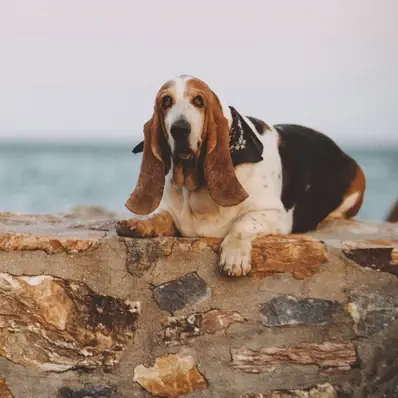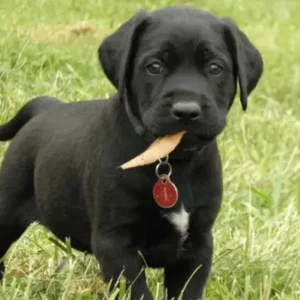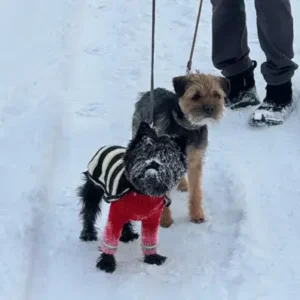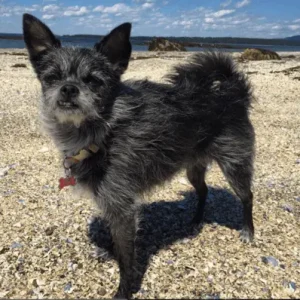Basset Hound History/Origin
The Basset Hound’s lineage can be traced back to the hounds of St. Hubert of Belgium around 1000 AD. They are recognized by the American Kennel Club (AKC) under the Hound Group.
Originating from the Laconian (Spartan) Hound known for their large size and scent-tracking abilities. The breed’s name “Basset” originates from the Latin word for low, “bassus,” combined with the French diminutive “-et.” Much like the Basset Hound, the Slovensky Kopov also excels in tracking, using its keen sense of smell to navigate and locate scents with precision.
Initially bred for fox and badger hunting, Basset Hounds gained popularity during Emperor Napoleon III’s reign in France. Formal breeding efforts began in France around 1870, leading to the development of distinct varieties such as the Chien d’Artois and the Basset Normand.
Basset Hound History- Source: Basset Hounds Owner Club
Introduced to England in the 1870s, Bassets influenced the development of a heavier type by the 1880s. Everett Millais played a pivotal role in refining the breed’s characteristics through selective breeding.
The first breed standard was established in Great Britain at the end of the 19th century. This standard was later updated in 2010 for continued breed preservation and excellence.
Basset Hound in 1901 – Source: Basset Hound Club Of Southern America.Inc
Basset Hound Personality
Basset Hounds are one of the dog breeds known and loved for their gentle and laid-back nature, making them cherished companions in family settings.
Their friendly and affectionate nature ensures they get along well with children and adults alike. Despite their hunting lineage, they typically don’t show aggression often and prefer lounging around over constant excitement.
If you’re looking for a laid-back and relaxed dog breed, the Basset Hound is an excellent choice.
However, it’s important to provide them with early socialization and training to prevent any potential stubbornness or undesirable behaviors.
- Basset Hound Temperament
These purebred dogs are known for their gentle and friendly temperament. They are affectionate and loyal companions, often forming strong bonds with their families. Despite their sometimes stubborn nature, they are generally good-natured and get along well with children and other pets.
Basset Hounds are sociable dogs that enjoy being part of family activities, but they also have an independent streak, which can make training a bit challenging.
- Potential challenges
Prospective owners considering bringing a Basset Hound into their homes should be aware of potential challenges associated with the breed. One notable aspect is their tendency to drool, which can vary in intensity among individuals. Managing drooling requires regular cleaning and providing appropriate water and food dishes.
Additionally, Basset Hounds are known for their stubbornness, which can present challenges during training sessions. Overcoming this trait requires consistent and patient training methods, coupled with positive reinforcement techniques.
Basset Hound Physical Appearance
These sturdy dogs are named for their low stature. One of the most distinctive features of Bassets is their long, droopy ears.
Their large, domed head features dark and expressive eyes that make them look sad. Their skin is also visibly loose and droopy, adding to their melancholic look.
- Basset Hound Size
Basset Hounds are medium-sized dogs known for their distinct low-slung bodies and sturdy builds. They typically stand between 12 to 15 inches tall at the shoulder.
The Basset dog weighs around 40 to 65 pounds, giving them a solid and well-proportioned appearance.
- Coat Color
When it comes to coat colors, Bassets offer a delightful variety. While tricolor (black, tan, and white) and red and white are the most common, you might also come across other combinations such as lemon and white or mahogany and white.
Their short, dense coats are weather-resistant, providing them with protection against various elements during outdoor adventures.
Basset Hound Gender Differences
When it comes to gender differences in Basset Hounds, males typically exhibit playfulness and affection, forming strong bonds with their families.
However, training may be challenging due to their short attention spans, requiring positive reinforcement techniques.
Male Bassets may develop conditions like separation anxiety for which it is important to monitor their behaviors.
Conversely, female Bassets start as independent pups but grow into more protective adults. Training them can also be difficult due to stubbornness, emphasizing the importance of early training.
Although there may be some general distinctions between male and female dogs, it’s important to recognize that individual temperament can vary significantly irrespective of gender.
Basset Hound Feed/Nutrition
A well-balanced diet tailored to their age, size, and activity level is essential for your dog.
Opt for high-quality dog food suitable for medium-sized breeds to provide the necessary nutrients for their overall health and energy needs. You can also add pineapple as an occasional treat, as it’s rich in vitamins and can support digestion.
Be cautious of overfeeding, as Basset Hounds are prone to weight gain, which can lead to health issues like joint problems and obesity.
Consult with a veterinarian to determine the appropriate portion sizes and feeding regimen to keep your Basset Hound healthy and happy.
Basset Hound Health
Like many breeds, they are susceptible to certain health conditions. Here are some common issues to be aware of:
- Canine Gastric Torsion: Also known as bloat, GDV is a serious condition where the stomach fills with gas and twists. This can be life-threatening and requires immediate veterinary attention.
- Von Willebrand’s Disease: This is a blood clotting disorder that can result in excessive bleeding, particularly after injuries or surgeries. Basset Hounds may be prone to this genetic condition.
- Panosteitis: Panosteitis, also known as “growing pains,” affects the long bones of young dogs, causing lameness and pain. While it usually resolves on its own as the dog matures, it can be uncomfortable for affected Basset Hounds.
- Hip Dysplasia and Elbow Dysplasia:These are developmental conditions where the hip or elbow joints don’t form properly, leading to arthritis and mobility issues. Regular monitoring and management are essential for affected Basset Hounds to maintain quality of life.
- Ear Allergies: Basset Hounds’ long, floppy ears can trap moisture and debris, leading to ear infections specially yeast infections. Allergies can exacerbate this issue, causing discomfort and irritation. Regular ear cleaning and monitoring for signs of infection are crucial for their ear health.
Basset Hound Care and Grooming
Basset Hounds are relatively low-maintenance when it comes to coat care, thanks to their fine, short coats. However, their wrinkly skin and tendency to drool mean they may need regular cleaning to prevent irritation and odor buildup.
While occasional baths are usually sufficient to keep them clean and fresh, it’s essential to pay attention to their nails and dental care.
Basset Hound ear problems are a common issue due to their size. Dirt and debris can easily get caught in them and cause infections. This is why it’s important to use vet-approved ear cleaners to regularly clean their ears.
Regular nail trimming helps prevent overgrowth and discomfort, while dental care, such as brushing their teeth regularly will help maintain their oral health. Additionally, potty training your dog is essential for establishing good habits and keeping your home clean.
Basset Hound Rescue
Several rescue organizations specialize in Basset Hounds, providing care and finding loving homes for dogs in need.
Basset Hound Price
The price of a Basset Hound typically ranges from $800 to $1,500, depending on factors like breeder reputation and pedigree.
If you’re looking for Basset Hounds for sale, make sure to only purchase from a reputable breeder.
Interesting Facts
- A puppy Basset Hound was featured on the cover of the The Times in 1928, where the story covered the 52nd Annual Westminster Kennel Club Dog Show.
Baby Basset Hound,1928- Source: Content.Time.com
- Often appearing in media and advertising, Basset Hound is the face of the brand Hush Puppies.
- Multiple cartoon dogs are based on Basset Hounds, like Droopy and the Basset Hound puppy character named AI featured in Paw Patrol.
Droopy dog- Source: Wikipedia
- In addition to being featured in multiple tv series and movies, a Basset Hound was sung to by Elvis Presley in The Steve Allen Show.
The Steve Allen Show- Source: Elvis History Blog
Best For
Basset Hounds excel as family pets, tracking dogs, and companions for those who appreciate their gentle demeanor and unwavering loyalty.
Top Names
| Male Basset Hound Names | Female Basset Hound Names |
| Charlie | Lucy |
| Max | Molly |
| Cooper | Maggie |
| Rocky | Rosie |
| Toby | Luna |








 Basset Hound History- Source:
Basset Hound History- Source:  Basset Hound in 1901 – Source:
Basset Hound in 1901 – Source: 

 Tricolor Basset Hound – Source:
Tricolor Basset Hound – Source:  Lime and white Basset Hound- Source:
Lime and white Basset Hound- Source: 
 Baby Basset Hound,1928- Source:
Baby Basset Hound,1928- Source:  Droopy dog- Source:
Droopy dog- Source:  The Steve Allen Show- Source:
The Steve Allen Show- Source: 






